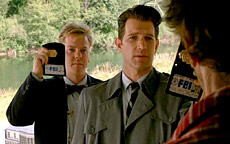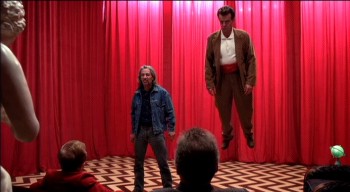|
After the short-lived but significant cultural phenomenon that was Twin Peaks the series, one might've hoped for a warmer reception for this, the cinematic prequel film that went into production within months after the series' end. Certainly David Lynch must've wished for a warmer welcome to a film that instead received panning and derision from the press and Peaks fans alike. Many things were blamed for the failure of the film, including its incredibly obtuse approach (even compared to the TV series) and its notable lack of the comedic slant the series possessed. Whatever the reason or reasons may have been, subsequent years and a new generation of fans have been more receptive to the film than the initial audiences, perhaps because many of them may have been first introduced to the world of Twin Peaks via Fire Walk with Me to begin with. While I wouldn't recommend it as a starting place, I would wholeheartedly recommend it.  The film begins one year before the death of Laura Palmer, whose murder had been the focal point of the television series. The first half-hour of the film is almost an entity unto itself, featuring a pair of FBI investigators on the trail of the killer of Teresa Banks, a drifter whose murder was recounted by Agent Cooper upon his initial arrival in the town of Twin Peaks at the series' beginning. While a few points from this segment of the film eventually bleed over into the main portion of the narrative (remember Deputy Cliff's face; you'll be seeing it again, however briefly), it seems almost to have been designed to be the seed for a spin-off which would feature the new characters it introduced (which it very well may have been), as most of the questions raised in this first half-hour are never resolved or even mentioned again for the rest of the film, most notably David Bowie's cameo as deranged FBI agent Phillip Jeffries, who appears out of nowhere long enough to give a rambling account of a mysterious meeting above a convenience store before going right back into the nowhere from whence he'd just come. After this somewhat bewildering intro, the main portion of the film begins nearly a year later, detailing the last week of Laura's life. The identity of her killer having been revealed in the series, Fire Walk with Me makes no bones about addressing his identity, which is why, amongst other reasons, it's not really advisable to see the film first, at least not if you ever plan to see the series. More than anything, the film is very bluntly about just how much it would suck to have been Laura Palmer, an incest victim who's turned to drugs and prostitution out of sheer despair. It's worth noting that while the American advertising posted the tagline "In a town like Twin Peaks, no one is innocent," an Italian movie poster appended that with "...except for Laura Palmer." In this respect, it's pretty understandable why the humor isn't so present as it was in the TV show; after all, the murder of a perpetually abused young girl is hardly an amusing topic, and trying to lighten the mood with humor would've hardly been appropriate to the seriousness of the subject being dealt with. What we get is a pantheon of emotions, some tinged with hope, many of them frightening, and almost all of them wrapped in sadness. The wistful longing felt in the "Questions in a World of Blue" sequence at the Road House may be among the most purely melancholy things ever put onscreen, immediately followed by the hypnotic ode to drugs and debauchery of the Partyland scene. Nothing, however, can top the intensity of the final scene of Laura laughing and crying as she waits for the angel to take her away at last; even for the non-spiritual amongst us, it's a scene with a core emotion that demands our feelings be poured out in return.  David Lynch has never been very content with straightforward storytelling: the TV series of Twin Peaks had a great deal of supernatural elements to it, and these are played to the hilt in the film (another reason, since he doesn't bother re-establishing the copious elements of the series' mythology here, that the film can be immensely befuddling to newcomers). Horror stories have long been used as a means of exploring our own inner demons, with everything from the original Dracula to Buffy the Vampire Slayer using the metaphors of otherworldly monsters as a way of examining real-life fears. Even if the murdering spirit BOB was clearly established as a literal monster in the series, he still functions as a symbol of both the horrors that can lurk within those we love and trust, and our own denial of the truth of such horrors. Other elements are less easily dissected: the diminutive Man From Another Place can't even be clearly seen as either a good guy or a bad guy, and what exactly is meant by having corn symbolize pain and sorrow (and calling it "garmonbozia," to boot) is something even Lynch himself probably couldn't explain, even if he were willing, which he tends not to be. It's impossible not to wonder if perhaps the story would've carried even more weight if it had eschewed the bizarre symbolism and presented Laura's story in a more normal fashion, a la Blue Velvet. I can't say if it would've been better, worse, or simply different if done "straight," as it were, but whatever the answer might be, there's no denying that Lynch marches to the beat of his own drummer, who probably has no clue what he's being asked to drum most of the time. Many films give up all their mysteries after one viewing, but Fire Walk with Me certainly doesn't. Details such as the two Chalfont families at the Deer Meadow trailer park and the burning odor that appears when the One-Armed Man accosts Laura and her father at a traffic light require a good knowledge of the details of the TV show to be worked out; there's even a precognitive dream sequence that addresses the unresolved cliffhanger of the final series episode, which gives some insight into what might've happened had the story continued. Plus, there's a plot point which finally addresses an issue raised in the pilot episode which was mysteriously never dealt with or even mentioned again throughout the series. Above all, this film shows what happens when a truly creative individual doesn't try and rein in or censor his imagination. We may not be able to perceive it all rationally, but it certainly feels like something we can understand at a fundamental level. Even if, as is most definitely the case, I have no earthly idea what that bit with the talking monkey was about. -review by Matt Murray
|
|
||||||||